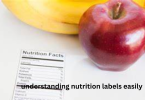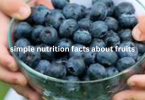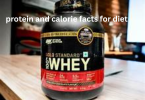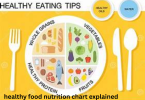Starting your health journey can feel like stepping into a maze of nutrition advice. There’s so much information out there about calories, carbs, protein, vitamins, and trendy diets that it’s easy to feel lost. Don’t worry—we’ll go step by step, covering the important nutrition facts for beginners in a way that’s simple, practical, and easy to apply in real life.
By the end of this guide, you’ll understand not only what to eat but why it matters, plus the benefits and potential drawbacks of each approach.
1. Food is Your Fuel – The Foundation of Nutrition

Your body is like a sophisticated machine, and food is its fuel. Every bite you take contributes to energy, muscle repair, brain function, and overall health. Poor fuel leads to low energy, poor focus, and long-term health issues, while good fuel powers your body efficiently.
Benefits of proper nutrition:
- Sustained energy throughout the day
- Better concentration and mental clarity
- Reduced risk of chronic diseases
- Stronger immunity
Drawbacks of ignoring nutrition basics:
- Fatigue and low energy
- Increased risk of obesity, diabetes, and heart disease
- Poor digestion and sleep quality
- Mood swings and brain fog
2. Macronutrients – The Big Three
Macronutrients are nutrients your body needs in large amounts: carbohydrates, proteins, and fats. Understanding them is one of the most crucial important nutrition facts for beginners.
Carbohydrates: Your Primary Energy Source
Carbs are your body’s main energy source. Without them, you may feel tired and sluggish. Focus on complex carbs like:
- Whole grains (brown rice, oats, quinoa)
- Vegetables and fruits
- Legumes (beans, lentils)
Benefits:
- Provides energy for daily activities and workouts
- Supports brain function
- Aids digestion (if fiber-rich)
Drawbacks of poor carb choices:
- Refined carbs and sugary foods can spike blood sugar
- Lead to energy crashes
- Excess intake may cause weight gain
Proteins: Building and Repairing
Proteins are essential for muscle repair, hormone production, and overall body maintenance. Include:
- Lean meats, fish, eggs
- Dairy products like Greek yogurt
- Plant-based proteins like lentils, beans, and tofu
Benefits:
- Helps build and repair tissues
- Keeps you fuller longer, reducing overeating
- Supports immune function
Drawbacks:
- Overconsumption, especially from red meat, may strain kidneys
- Processed protein sources may contain unhealthy additives
Fats: Essential, Not Evil
Healthy fats are critical for brain health, hormone balance, and nutrient absorption. Include:
- Avocados, nuts, seeds
- Olive oil and fatty fish (salmon, mackerel)
Benefits:
- Supports brain function
- Promotes heart health
- Improves absorption of vitamins A, D, E, K
Drawbacks:
- Too much fat can lead to weight gain
- Trans fats in processed foods increase risk of heart disease
3. Micronutrients – Vitamins and Minerals
Micronutrients, though needed in small amounts, are vital. They regulate metabolism, immunity, and growth.
Key micronutrients:
- Vitamin D: Bone health, immunity
- Vitamin C: Healing and immunity
- B Vitamins: Energy and mental clarity
- Iron: Oxygen transport, prevents fatigue
- Calcium: Strong bones and teeth
- Magnesium: Relaxation, sleep, and muscle function
Benefits:
- Strong immune system
- Healthy bones and teeth
- Proper energy metabolism
Drawbacks of deficiency:
- Fatigue, weakness, and frequent illnesses
- Poor bone and muscle health
- Mental fog and mood swings
4. Hydration – The Forgotten Key
Water is critical for digestion, nutrient transport, temperature regulation, and even skin health. Beginners often overlook it.
Guideline: Aim for 6–8 glasses per day, more if active or in hot climates.
Benefits:
- Prevents dehydration
- Supports weight management and digestion
- Improves skin health and mood
Drawbacks of poor hydration:
- Fatigue and poor concentration
- Constipation and digestive issues
- Increased risk of headaches
5. Portion Control – Eat the Right Amount
Even healthy foods can cause weight gain if eaten in excess. Beginners should learn simple portion guidelines:
- Half your plate: vegetables
- Palm-sized protein portion
- Fist-sized carbohydrate portion
- Thumb-sized fat portion
Benefits:
- Prevents overeating
- Helps maintain healthy weight
- Teaches mindful eating
Drawbacks of ignoring portion sizes:
- Overeating, even healthy foods
- Weight gain
- Digestive discomfort
6. Whole Foods vs. Processed Foods
Whole foods are foods close to their natural state. Processed foods are often high in sugar, salt, and unhealthy fats.
Benefits of whole foods:
- High in nutrients and fiber
- Fewer empty calories
- Better for long-term health
Drawbacks of relying on processed foods:
- Poor nutrition despite calorie intake
- Higher risk of chronic diseases
- Mood swings and low energy
You may also like to read these posts:
Low Calorie Recipes for Weight Loss: Eat Smart, Feel Great, and Stay Full
Nutritious Breakfast and Dinner Ideas: A Complete Guide to Eating Healthy Every Day
Healthy Food Recipes for Daily Diet
Best Healthy Recipes for Busy People: Simple, Delicious, and Nutritious Meals You Can Make Anytime
7. Don’t Skip Meals

Skipping meals can lead to low energy, sugar cravings, and overeating later. A balanced breakfast is especially important.
Benefits:
- Stabilizes blood sugar
- Supports metabolism
- Reduces overeating
Drawbacks of skipping meals:
- Energy crashes
- Impaired focus and productivity
- Increased cravings for unhealthy foods
8. Listen to Your Body
Your body gives signals of hunger, fullness, and nutrient needs. Beginners often eat by habit, not hunger.
Benefits of listening to your body:
- Prevents overeating
- Helps develop mindful eating habits
- Improves digestion
Drawbacks of ignoring signals:
- Weight gain or loss
- Digestive issues
- Poor energy regulation
9. Small Steps Create Big Change
Nutrition isn’t about perfection; it’s about consistency. Begin with small, sustainable changes:
- Drink more water
- Add vegetables to every meal
- Replace refined carbs with whole grains
- Walk 10–15 minutes daily
Benefits:
- Easier to maintain long-term
- Builds healthy habits gradually
- Less overwhelming
Drawbacks of expecting quick fixes:
- Frustration and discouragement
- Unsustainable diets
- Possible nutrient deficiencies
Final Thoughts
Learning the important nutrition facts for beginners sets the foundation for a healthier, happier life. Good nutrition supports your energy, focus, immunity, and long-term wellness. While there are many fads and extremes, the most effective approach is simple: eat balanced meals, stay hydrated, choose whole foods, practice portion control, and listen to your body.
Remember, even small changes can have a big impact over time. Start today—your body will thank you tomorrow!
FAQs
1. What are the most important nutrition facts for beginners?
The key facts include understanding macronutrients (carbs, proteins, fats), micronutrients (vitamins and minerals), hydration, portion control, and choosing whole foods over processed foods. Consistency and listening to your body are also essential.
2. How many meals should a beginner eat per day?
Most beginners benefit from 3 balanced meals and 1–2 healthy snacks, but it depends on your lifestyle and hunger cues. Skipping meals can lead to fatigue and overeating later. Focus on balance rather than strict schedules.
3. Are carbs really bad for you?
No! Carbs are your body’s main energy source. The trick is to choose complex carbs like whole grains, fruits, and vegetables instead of refined sugar and processed carbs.
4. How much protein do I need as a beginner?
A general rule of thumb is 0.8–1 gram of protein per kilogram of body weight per day for sedentary individuals. Active beginners or those doing strength training may need more. Sources include eggs, fish, lean meat, lentils, beans, and nuts.
5. Should I avoid fats completely?
Absolutely not. Healthy fats are essential for brain function, hormone balance, and vitamin absorption. Include sources like avocado, olive oil, nuts, seeds, and fatty fish. Avoid trans fats and highly processed fats.






